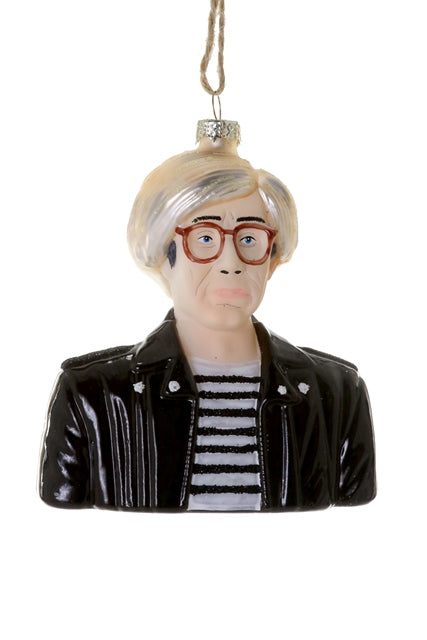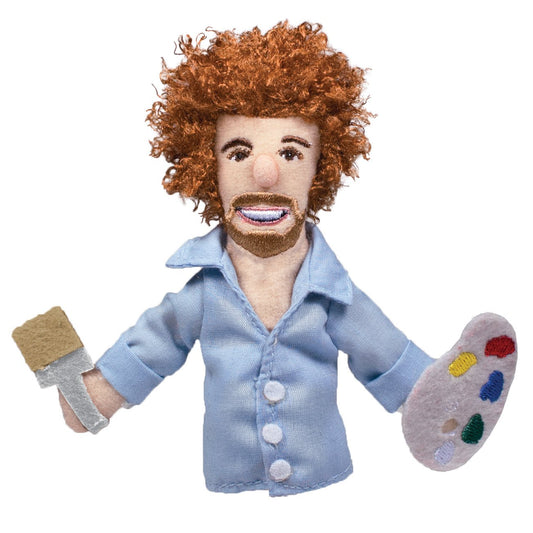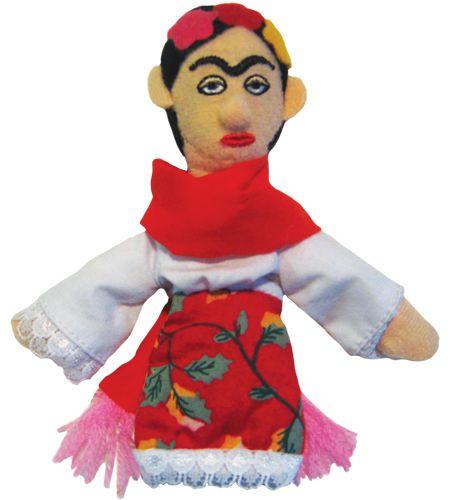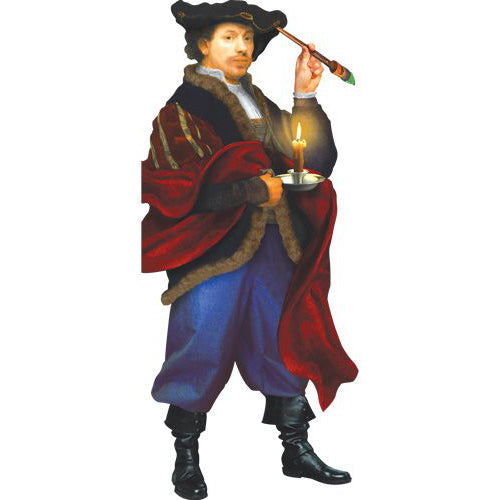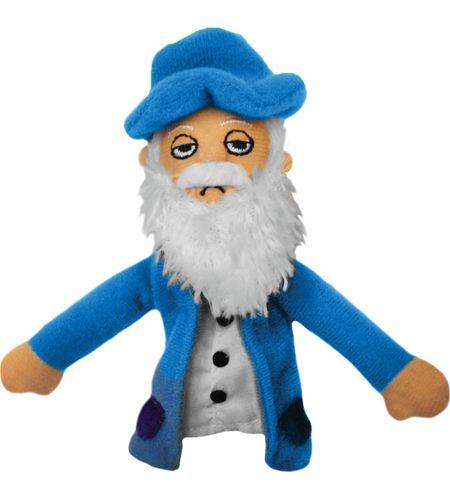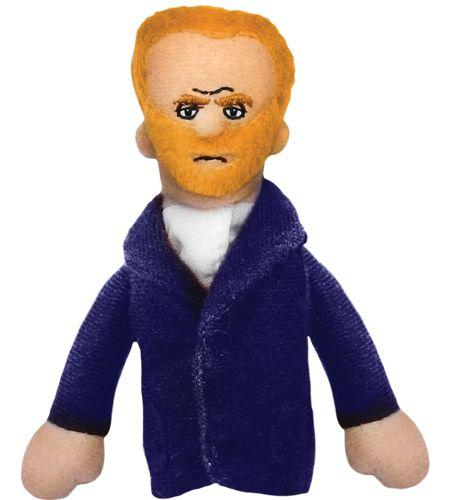Tarjeta de notas troquelada con pegatinas de Andy Warhol
Tarjeta de notas troquelada con pegatinas de Andy Warhol
The Unemployed Philosopher's Guild
Agotado
No se pudo cargar la disponibilidad de retiro
Andy Warhol dijo una vez que su idea de una buena imagen era aquella que estaba enfocada y era de una persona famosa. Entonces, ¿qué podría ser mejor que nuestra tarjeta de notas troquelada de Warhol? Cada tarjeta viene con un sobre y una hoja de calcomanías con citas de Warhol y mensajes tradicionales como "Feliz cumpleaños".
- Incluye sobre y hoja de pegatinas.
Product Details
Product Details
- Product type: Blank Note Card
- Shipping Dimensions: 8.75 × 4.0 (22.2 × 10.2 cm)
- Shipping Weight: 0.13 lb (2.0 oz; 57 g)
- SKU: SKU: SKU010003161
- UPC: 814229005568
Share



About the Artist
Andy Warhol
Andy Warhol (American, 1928 - 1987) was a visual artist, film director, and producer who was a leading figure in the visual art movement known as pop art. His works explore the relationship between artistic expression, advertising, and celebrity culture that flourished by the 1960s, and span a variety of media, including painting, silkscreening, photography, film, and sculpture. Some of his best-known works include the silkscreen paintings Campbell's Soup Cans (1962) and Marilyn Diptych (1962).
More Andy Warhol
-
Pulsera Polígono Pop-Art
Precio habitual £9.10 GBPPrecio habitualPrecio unitario / por -
Tarjetas de latas de sopa de ponche de huevo
Precio habitual A partir de £3.76 GBPPrecio habitualPrecio unitario / por -
Adorno de vidrio soplado: Andy Warhol
Precio habitual £12.86 GBPPrecio habitualPrecio unitario / por -
Pulsera Polígono Pop-Art
Precio habitual £9.10 GBPPrecio habitualPrecio unitario / por -
Cow by Andy Warhol - Die-Cut Sticker
Precio habitual £4.55 GBPPrecio habitualPrecio unitario / por -
Tarjetas de Papá Noel de arte pop
Precio habitual A partir de £3.41 GBPPrecio habitualPrecio unitario / por -
Placa de Andy Warhol
Precio habitual £22.76 GBPPrecio habitualPrecio unitario / por -
60s Silkscreen by Andy Warhol - Sticker Pack of 3
Precio habitual £13.65 GBPPrecio habitualPrecio unitario / por -
Big Banana by Andy Warhol - Die-Cut Sticker
Precio habitual £6.07 GBPPrecio habitualPrecio unitario / por -
Warhol Soup Can Stress Reliever
Precio habitual £6.82 GBPPrecio habitualPrecio unitario / por

About the Brand
The Unemployed Philosopher's Guild
The origins of the Unemployed Philosophers Guild are shrouded in mystery. Some accounts trace the Guild's birth to Athens in the latter half of the 4th century BCE. Allegedly, several lesser philosophers grew weary of the endless Socratic dialogue endemic in their trade and turned to crafting household implements and playthings. (Hence the assertions that Socrates quaffed his hemlock poison from a Guild-designed chalice, though vigorous debate surrounds the question of whether it was a "disappearing" chalice.)
Others argue that the UPG dates from the High Middle Ages, when the Philosophers Guild entered the world of commerce by selling bawdy pamphlets to pilgrims facing long lines for the restroom. Business boomed until 1211 when Pope Innocent III condemned the publications. Not surprisingly, this led to increased sales, even as half our membership was burned at the stake.
More recently, revisionist historians have pinpointed the birth of the Guild to the time it was still cool to live in New York City's Lower East Side. Two brothers turned their inner creativity and love of paying rent towards fulfilling the people's needs for finger puppets, warm slippers, coffee cups, and cracking up at stuff.
Most of the proceeds go to unemployed philosophers (and their associates). A portion also goes to some groups working on profound causes.
-
Museum Store Association Member
The Museum Store Association supports the cultural non-profit retail industry and the people who work in it.
-
Supports Non-profit Organizations
A portion of proceeds is donated to non-profit organizations. See description for details.
-
Designed in USA
Designed in the USA, with global manufacturing or assembly.
More from The Unemployed Philosopher's Guild
-
Marioneta de dedo magnética de Bob Ross
Precio habitual £6.79 GBPPrecio habitualPrecio unitario / por -
Marioneta de dedo magnética Frida Kahlo
Precio habitual £6.79 GBPPrecio habitualPrecio unitario / por -
Copa de Arte Moderno
Precio habitual £15.13 GBPPrecio habitualPrecio unitario / por -
Frida Dreams Mug
Precio habitual £15.13 GBPPrecio habitualPrecio unitario / por -
Diego Rivera Magnetic Finger Puppet
Precio habitual £6.79 GBPPrecio habitualPrecio unitario / por -
James Baldwin "Little Thinker" Plush Doll
Precio habitual £18.21 GBPPrecio habitualPrecio unitario / por -
Tarjeta de notas troquelada de Rembrandt con pegatinas
Precio habitual £3.00 GBPPrecio habitualPrecio unitario / por -
Marioneta de dedo magnética de Claude Monet
Precio habitual £6.79 GBPPrecio habitualPrecio unitario / por -
Marioneta de dedo magnética de James Baldwin
Precio habitual £6.79 GBPPrecio habitualPrecio unitario / por -
Marioneta de dedo magnética de Vincent van Gogh
Precio habitual £6.79 GBPPrecio habitualPrecio unitario / por





